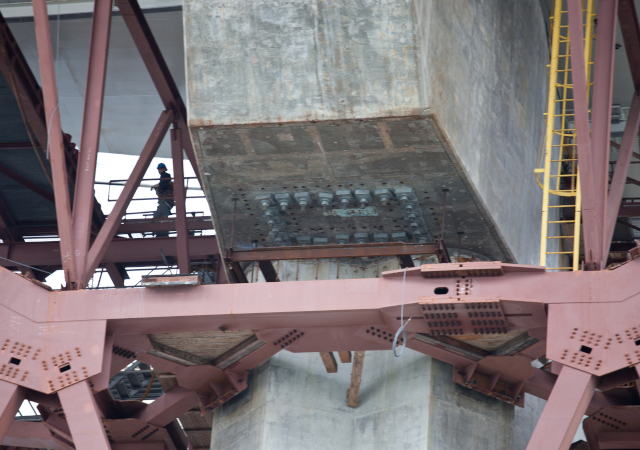The report has gotten widespread media attention. A couple sample leads:
Lisa Vorderbrueggen, Contra Costa Times: Bay Bridge construction managers systematically shut down safety critics, investigation concludes
Caltrans systematically squelched serious allegations about the structural safety of the new eastern span of the Bay Bridge, concluded an investigation commissioned by the state Senate Transportation Committee.
Caltrans managers marginalized dissenters, fired critics, reassigned outspoken engineers and urged those involved to avoid putting details of problems or issues in writing that would have to be disclosed under the state's Public Records Act, the report concluded.
Jaxon Van Derbeken, San Francisco Chronicle: Caltrans accused of trying to hide Bay Bridge problems
A Caltrans engineer and an outside expert working on the Bay Bridge eastern span accused agency officials of discounting warnings about cracked welds on the bridge, and telling them not to put their concerns in writing to keep them from becoming public, according to a report commissioned for a state Senate committee.
An official overseeing the long-delayed, $6.4 billion project told a Caltrans engineer who had examined the Chinese-made welds "not to record his concerns in writing, either on paper or e-mail, but rather to communicate orally," said the report for the Senate Transportation and Housing Committee, which was released Wednesday. A quality-control consultant said Caltrans supervisors "did not want a record that would be legally available through the California Public Records Act," the report said.
And Charles Piller of the Sacramento Bee runs down the report's key disclosures:
- Quality control managers found thousands of cracks in welds produced by a Chinese contractor for the span’s signature tower and roadway. Rather than ordering all needed fixes, top California Department of Transportation managers replaced those who discovered the problems.
- Millions of dollars were paid to the same Chinese contractor to speed up work after it fell behind schedule and bridge officials urgently wanted faster results.
- Bridge officials rejected warnings in 2008 that suspect anchor rods for the suspension span were not adequately tested; some of those rods snapped last year.
- Officials frequently told contractors and employees not to put concerns about quality into writing – ostensibly to avoid disclosure under the state Public Records Act
.
Here's the latest from the Associated Press on the Bay Bridge report, followed by the report itself:
Jason Dearen
Associated Press
A California Senate report released Wednesday on the construction of the new eastern span of the San Francisco-Oakland Bay Bridge raises questions about the quality of workmanship used to build the $6.3 billion span.
The report by the state Senate's Transportation and Housing Committee contains testimony from engineers that question the durability of welds on bridge pieces produced in China and the integrity of large bolts used to hold earthquake-safety equipment in place.
Still, both engineers say that despite the defects, they don't believe the bridge to be unsafe, but that parts of it will need expensive retrofitting sooner than they should.
The report's investigators found that California Department of Transportation managers dismissed concerns from quality-assurance experts that the Chinese firm Shanghai Zhenhua Heavy Industry Co. Ltd, or ZPMC, hired to do key bridge welds, lacked the experience to meet standards.
James Merrill, an engineer who oversaw weld inspections in China, told investigators that his staff found hundreds of weld cracks. He told Caltrans officials they were taking a "great risk" in allowing ZPMC to do the work, according to the report.
At the time, the contract with ZPMC called for no cracks at all, so Merrill's firm MacTec Engineering rejected the pieces, leading to severe delays.
Merrill said Caltrans was concerned about the delays, and that he was told he was being "too rigorous" in his inspections.
Caltrans failed to renew MacTec's contract after the disagreement over ZPMC's work and hired another firm, Alta Vista Solutions, that turned out not to be qualified for the job, according to the report.
Bridge spokesman Andrew Gordon said officials would address the report's findings at a meeting on Friday before the committee.
The report also found that Caltrans forced another of its supervising bridge engineers off the job after supervising work on the welds being made in China.
"The Chinese were not catching stuff," former Caltrans bridge engineer Douglas Coe, a 25-year department veteran, told the report's authors. "Why are we finding all these cracks?"
Coe said he felt pressure from bridge managers Tony Anziano and Peter Siegenthaler not to stop work, and that eventually he argued that Caltrans should change the language in the contract — which permitted no cracks in the welds — if managers were going to order them through.
Caltrans eventually changed that language.
"This is the first time in my career the engineering wasn't allowed to be done right," Coe told investigators. "I'm mad as hell that the Department (Caltrans) put me in a position to have to say this. ... But if that bridge starts to crack in five years it's all going come out."
Caltrans' Anziano and Siegenthaler told the investigators that the weld cracks in question were repairable and have been mostly fixed. They maintain that the bridge is safe.
"No one was discouraged in reporting quality assurance," Anziano said in the report.
The report also faulted Caltrans with allowing a number of giant steel bolts to be installed despite a lack of quality-assurance testing.
Instead of rejecting the bolts, Caltrans managers "resolved the situation by changing the specifications on the bolt fabrication contract and then accepted them 'as is,' " the report found.
Dozens of the bolts ended up snapping after being tightened in March, leading to a $25 million repair job.
MacTec's Merrill told investigators that he suggested the bolts undergo more testing.
"I got told we weren't doing any testing and to stop mentioning it," Merrill told the panel's investigators. "I was basically told to stop bringing it up. That was the end of that."
Caltrans has disputed that it dismissed quality-assurance concerns to get the bolts installed on time.
